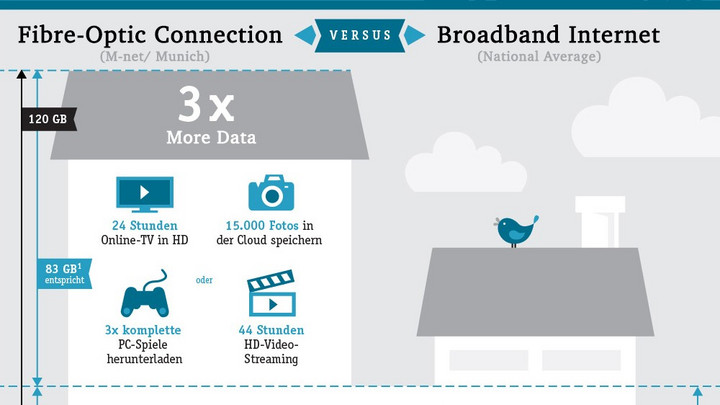Gigabit Infrastructure: The Need is Proven
It’s proven: The more bandwidth you have, the more you will use. The eco Association’s Nico Goss discusses the findings of the Bavarian telecom and ISP M-Net that the provision of high-speed Internet through Fiber to the Home or Business significantly influences demand for broadband.

M-Net: Fiber-Optic Connection vs. German Average Broadband Internet
Measurements by the eco member M-Net GmbH have found that customers with fiber-optic connections (FttH/FttB) reach an average data volume of 120.0 GB. The company’s conclusion is that customers use higher bandwidths when they are available. In a period of approximately one and a half years, the data volumes per customer double.
With the increasing connectivity of traffic and the Internet of Things in domestic, industrial, and smart city contexts, the demand will continue to grow significantly. Private customers raise the data volume by streaming videos in high quality, like Full HD or 4k (see “Live Broadcasting – Driving the Infrastructure Requirements and Technologies of Future Viewing”). For this and other reasons, the need for other features of high-quality Internet connections, such as latency and packet transmission time, is also growing.
The results from M-Net support eco’s calls for a gigabit network rollout, largely financed through investment in a competitive environment. This should be further supported through state funding in regions where private-sector expansion would not be profitable in the medium to long term. With regard to state-based subsidies, it must be ensured that the corresponding tendering process is transparent and designed according to objective specifications. This will ensure that a range of different companies submit tenders for the expansion. This would, in turn, take the competitive aspect into account.
Not only current, but also prospective future customers would benefit from this. The acceleration of the rollout of a high-speed network would also have a positive impact on the economy as a whole and increase the possibilities for the participation of citizens in a digital society (see “Information and Energy: The Ultimate Paradigm for Growth of the Digital Economy” for more on the economic impact of connectivity). The benefits of the roll-out of gigabit-infrastructure should not be underestimated.
More from eco on the topic of broadband can be found here.
Nicolas Goss is a telecommunications and regulatory consultant at eco. He is a trained lawyer responsible for the political and legal issues surrounding the German Telecommunications Act and the Federal Network Agency.



